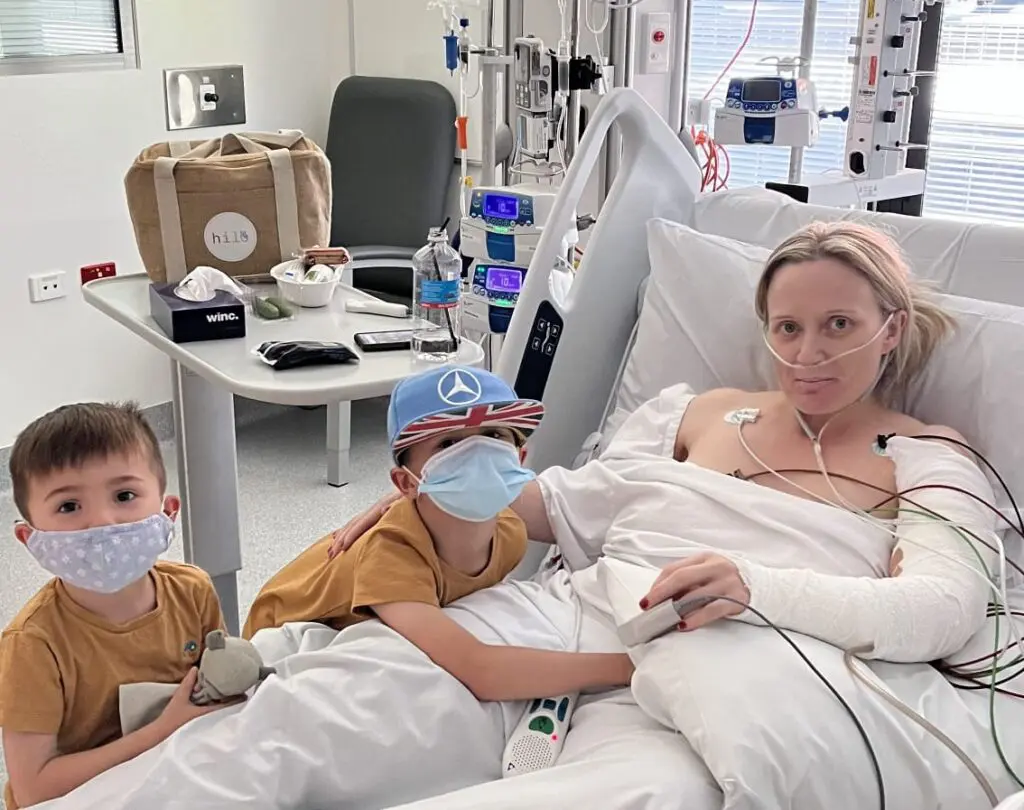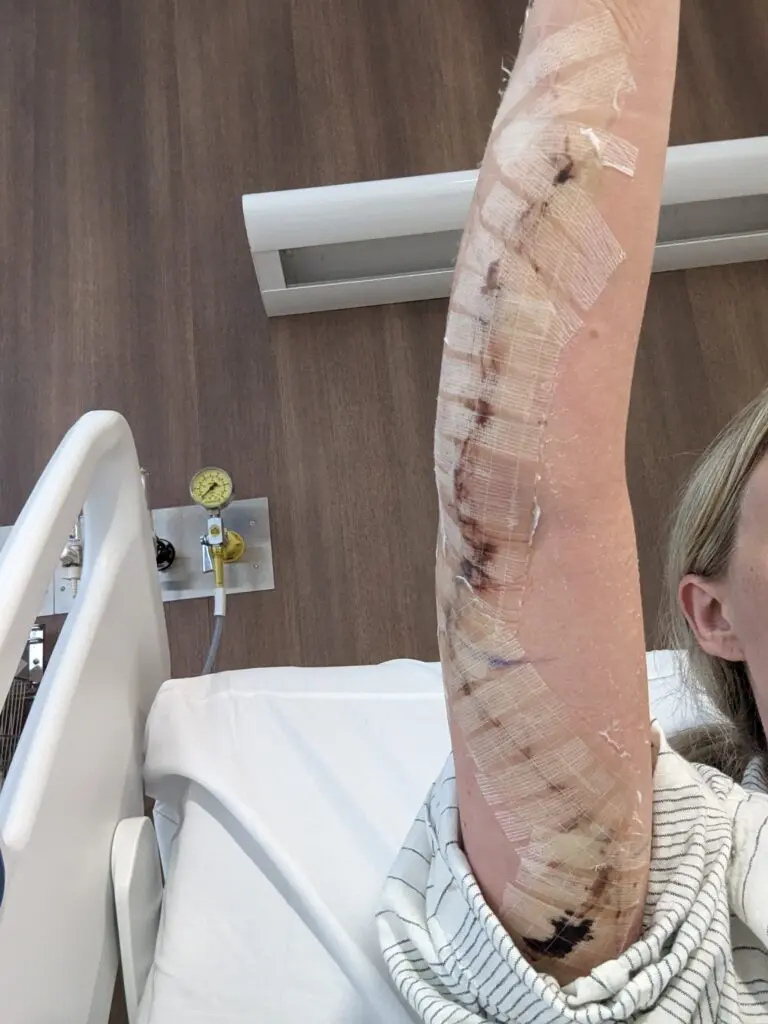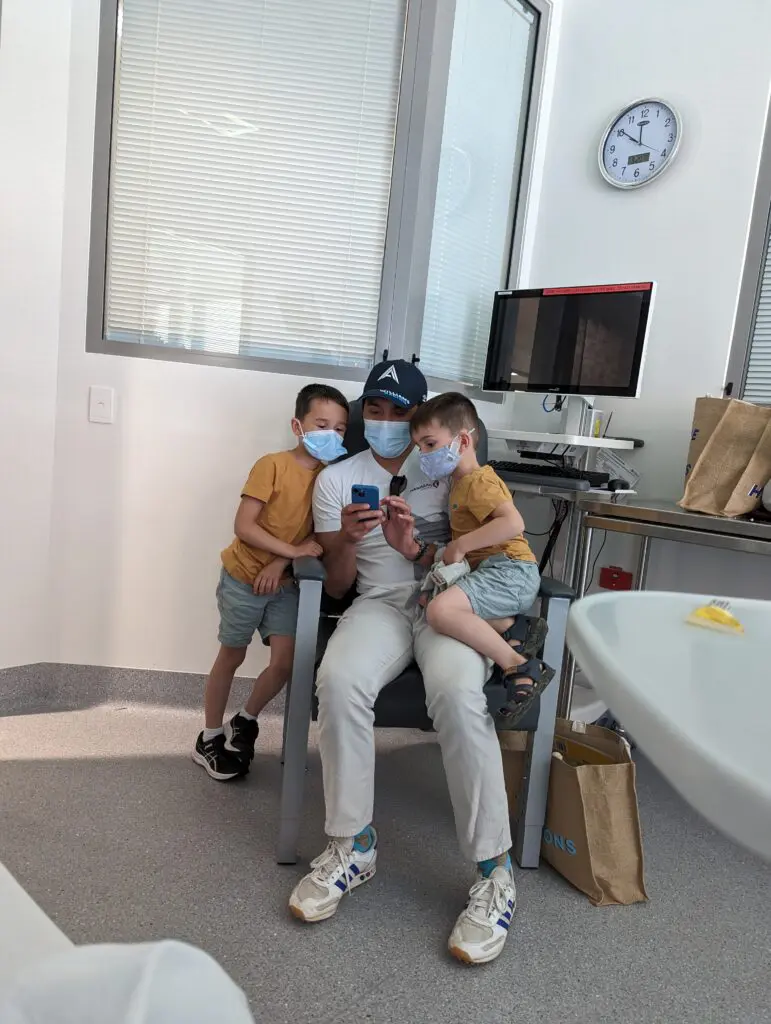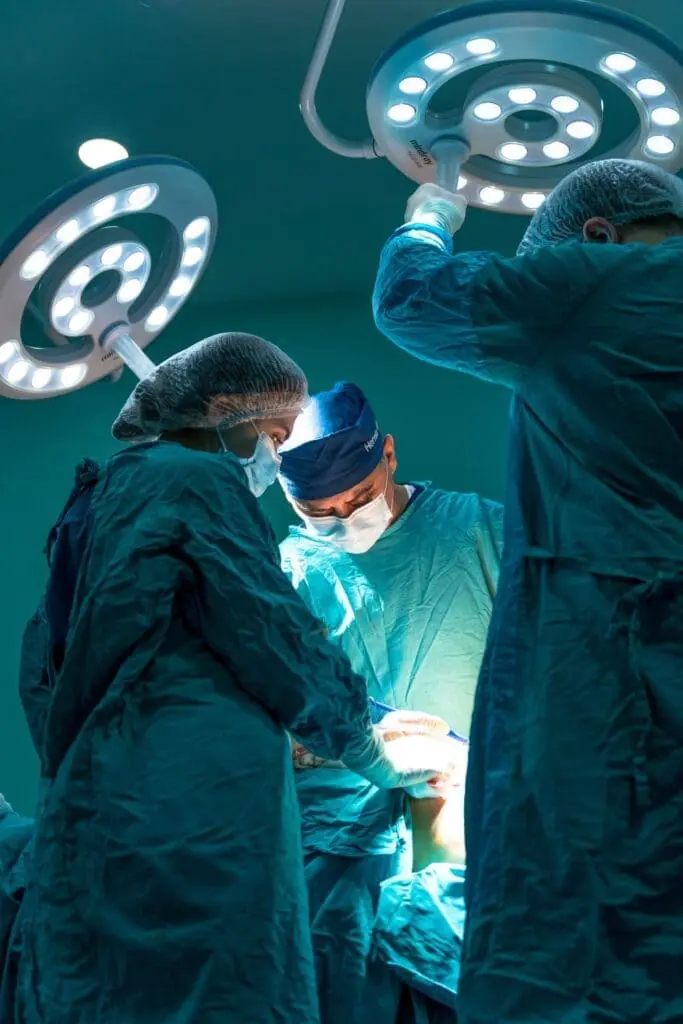
On a seemingly ordinary family day out, Jen’s life took a dramatic turn when she was suddenly struck by necrotising fasciitis. This rare and severe condition would soon reveal the crucial role of Hornsby Ku-ring-gai Hospital healthcare staff and the specialised care they provided to save her life.
It was the first day of the school holidays and Jen and her husband Damian took their sons on a day out to Hunter Valley to see the Christmas lights.
“I started to get stomach cramps in the afternoon, and I just put it down to a stomach bug and thought nothing more about it,” said Jen.
On the way home, Jen’s symptoms started to escalate, and she had developed a fever, so upon arriving home, she went to bed. A restless night of nausea and fever followed, and, by morning, she was vomiting.
“I was sitting on the bathroom floor and when I went to push myself up using my left arm, it felt sore,” Jen recalled.
She went back to bed feeling incredibly unwell and nauseous, and noticed a small patch of redness on her left elbow, which was very hot to touch and the level of pain in her arm was increasing.
Whilst at first Jen thought it was gastroenteritis which in time would pass, she followed her gut instinct, thinking something just wasn’t right. So, she called Health Direct for advice. Health Direct is a free service providing quality, approved health information and advice. On explaining her symptoms to the registered nurse, Jen was advised to go to the emergency department at her local hospital.
Hornsby Ku-ring-gai Hospital is a short drive from Jen’s home and Damian took her there at lunchtime that day. Jen said she would call him in a few hours to come and collect her.
“Never in a million years did I think it would be two weeks later,” said Jen.
It didn’t take long for Jen to be triaged, which is where a specialist nurse categorises patients based on the severity of their symptoms. On hearing the nurse on the phone say the words “sepsis” and “fast track”, even though Jen had little medical knowledge, she knew it was serious.
In the emergency department, Jen was given intravenous fluids, antibiotic infusion therapy for the infection and morphine for the pain in her arm. Later that day, she was admitted to an inpatient ward but the first 24 hours in hospital were hazy for Jen as she was acutely unwell.
Doctors diagnosed Jen as having developed the invasive group A streptococcal disease, which in the early stages, can mimic symptoms of viral infections like influenza and gastroenteritis.
Strep A bacteria generally causes mild diseases such as sore throats (strep throat) and skin sores (impetigo); however, it can also cause life-threatening diseases including infection of the blood (sepsis), meningitis and pneumonia. The bacteria most commonly enters the body through a break in the skin although there was no obvious point of entry on Jen’s elbow.
Later that day during surgery on her arm to review the extent of the infection, the surgeon sent a tissue sample to pathology at Royal North Shore Hospital. Soon after, the result came back that Jen had necrotising fasciitis, also known as the “flesh-eating disease.” The Strep A bacteria had developed into an aggressive skin and soft tissue infection that caused necrosis, or death, of her muscle’s connective tissue and subcutaneous tissues which lie beneath the skin.
Further aggressive surgery was required the following day to remove the dead and infected skin tissue.
“I vividly remember one of the surgeons telling me the priority was saving my life, rather than my arm.”


Jen remembers one of the many surgeries being held under local anaesthetic, due to other medical complications. The process was very traumatic as she was conscious throughout the whole procedure. The doctors worked hard to improve the experience for Jen, using heated blankets, playing the radio and talking to her through the procedures to create a more calming, less overwhelming environment.
“That moment of human kindness was much appreciated. I’m beyond grateful for the exceptional care I received from everyone at Hornsby Hospital who saved my arm and my life. You never want to end up in the Intensive Care Unit (ICU), but the amount of care, attention and regular contact with the nurses and doctors was amazing. I felt very fortunate the whole way through that I was receiving world-class care.”
With her left arm in a sling and the other hooked up to IV drips, she was unable to move or look after herself and felt extremely vulnerable. As a mum, she would always put her family before herself, running the home and organising the family. Now she had to let the Hornsby Ku-ring-gai Hospital healthcare staff look after her and provide the expert care she required.
After eight days in ICU, Jen was transferred to a ward. The following day she had reached her limit of being brave and broke down. Jen had at least one more surgical procedure to go, but just wanted to go home and be with her boys.
“One of the nurses, Jacqui, showed me such kindness and gave me a big hug. She then organised to wheelchair me to the hospital cafe to see Damian and the boys. Jacqui was my chaperon as I was hooked up to so many things, but I really appreciated the incredible effort she went to,” said Jen.
After each surgery her doctors would update Damian who was looking after their two young boys and also keeping Jen’s family in England informed of her progress. The doctors shared their phone numbers with Damian which Jen said was “exceptional and reassuring for Damian and made the world of difference” to be able to contact them at any time.
“Every visit from the boys was the highlight of my day. The nursing staff would make a big fuss over the children, and they warmly welcomed them when they came to visit. The staff ensured we had extra visiting chairs – they even gave the boys icy poles!”
Christmas is an exciting time of year especially for young children and Jen psychologically prepared herself for being in hospital during this time. Damian organised a video of messages from friends and family around the world and a video of the children opening some of their presents. They saved a few presents to open with her and Jen recalls ICU was full of Christmas paper and Pokémon that day!
Jen returned home on New Year’s Day after five surgeries across 15 days in Hornsby Ku-ring-gai Hospital. Her best friend flew over from England which was a surprise and positively impacted her mental health. “She was my driver, my child bather and my left arm!”
It took a few months for Jen to be able to regain full use of her arm due to the extent of her wound. Jen received physiotherapy to desensitise and break down the scar tissue with massage and was referred to a psychologist to work through the trauma of her complicated surgical procedures.
She credits both her doctors – Orthopaedic Surgeon Dr Jobe Shatrov and Specialist Plastic Surgeon Dr Tim Wang – as having sympathetic bedside manners and she feels very lucky to have Hornsby Ku-ring-gai Hospital as her local hospital.
“I constantly felt very fortunate to be at Hornsby Ku-ring-gai Hospital as the care was exceptional and the kindness and humanity were next level, which makes such a difference in your recovery as it was a very lonely and vulnerable time,” said Jen.
If you would like to say thank you to healthcare staff for the care they provided to you or a loved one, please make a donation here.
